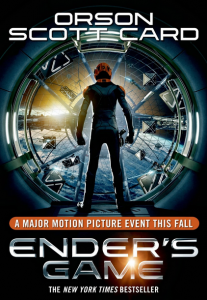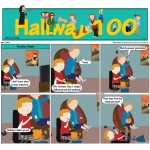Ender’s Game: Or is it a game? (Ender’s Game Book Review)
Ender’s Game Book Review
How this works: Below you’ll find a summary of the review (e.g. should I read it?) with NO spoilers. Below this you’ll find the meat of the work–a nice in-depth review chock full of spoilers, for those who have read the book and want to hear my humble opinion on the most detailed of points. Why? Because non-spoilery reviews are dull, but useful if you have not read the book. An honest review requires we look at all aspects of the book, and spoilers come with the territory. You have been warned. Afterward, you’ll find a recommendation on what to read next if you enjoyed it.
 SUMMARY (should you read it?):
SUMMARY (should you read it?):
Yes, as someone who is not necessarily a huge sci-fi fan, I found this to be a thrilling book. You follow the protagonist as he must overcome a constantly increasing odds in a military training compound for children. The author does a phenomenal job of putting you inside Ender’s mind and taking you through his thought process as he figures out a brilliant way to overcome each challenge thrown at him. This aspect especially is something I have never seen done so well. Though this was written in 1985, it is surprisingly believable for a futuristic setting. I doubt many people could have predicted the current state of the internet and tablet use twenty years ago. From the start you are thrown into Ender’s skin and you’ll wish there was more after you finish. At which point, come back here to see our take on the book! Then scroll down even farther to see which books we recommend reading next!
IN-DEPTH ANALYSIS (spoilers!!!):
In a sci-fi book you always run the risk of getting too preachy with metaphors or focusing on the details of advanced technology at the cost of not developing your characters. Not all sci-fi is like this, but many authors fall in to this trap. Ender’s game is one of the former. Yes, it’s sci-fi, and man is it awesome! But at it’s heart it’s the story of a boy who has to save humanity at the cost of his childhood.
The beginning was good–I don’t have too much to say. Everything was timed right, as far as the transitions went. We had enough time to see Ender’s relationship with his family, and how Peter is a twisted psychopath (don’t worry though, he’s bipolar too, evidenced when he tells his brother he loves him). So yeah, very healthy brother there. I mean, if I was in government, and like totally knew the degree to which this demon child was disturbed, I’d totally just sit on my thumbs and see if he took over the world. Not a huge cause for concern, right? That’s pretty much Graff’s attitude, I’m not joking. It’s like, “I live in space dorks, so, you know, have fun with that shit down there.”
Harsh, I know, but I only kid because I enjoyed it. Again, this book is great!
Battle School was my favorite part without a doubt. Every chapter brought something new, and it flowed so well. How many times can you change up “fight another team in battle.” Imagine half a Harry Potter book dedicated to Quidditch. No thanks. But this worked! From Ender, Shen, and Alai figuring out how to move in zero gravity, to Ender finally receiving his own army, each chapter just got better than the last. It was really fun to see Ender’s coping process as well. Card really walked us through Ender’s problem solving skills, and I thoroughly enjoyed it. It made sense, and was so much fun learning along with him!
There were times I disliked Graff, or perhaps it was more that I disagreed with him, but I never doubted he had Ender’s best interests at heart. Well, maybe a little doubt, but not much. I thought it was great to see him be so honest with Valentin. They left the BS at the door. The scene also showed how much Ender had changed since the first two chapters. It was hard to realize, as we had grown up with him, but he wasn’t the fun little kid anymore. He was still a kid, but he was worn out. And it was nice to see that kid part resurrect, if only for a short while.
And then the information came flowing through. We knew bits and pieces about the whole reasoning behind this mistreatment of children, but this is where the exposition really started. And though I missed the action of the battle school, I loved the reveals. The reveal of Mazer Rackham was good, but frustrating because I preferred Graff. I’ll admit though, I sped through the pages with Rackham. We learned so much about the Bugger’s in that last half. The threat, which at one point was suggested to never have existed, was no palpable. We could now understand what Graff was constantly talking about when he talked about them having the clock on their backs. So a cool twist, but not as good as what was to follow. I let out a “YES!” when I saw that Alai, Shen, Petra, and of course, BEAN were back! I knew it to. As soon as Rackham explained the game, I thought, “it would be awesome if they brought in Ender’s buddies from Battle School. They know him so well.” Of course, I thought that would come when the actual invasion started. But no, just a few paragraphs later. I don’t normally admit this, but yes, I had that warm-mushy feeling as I read it. I loved it, Ender had his friends again!
The pain and suffering Ender went through at this point was brilliantly written. I almost felt sick reading it. I totally understood what he was going through, not because of my own experiences, because of how well the author developed the tension. Ender had been through so much, now it just seemed like overkill. And we see Graff again, trying to convince Rackham to go easy on him. I seriously can’t wait to see Harrison Ford play this guy in the movie.
The twist at the climax was phenomenal and gut wrenching at the same time. I remember verbally going “WHAT?” It made so much sense, but was such as unexpected twist. The book always held an edge of intrigue, but it hid this twist so well by dwelling on Ender’s suffering as he practiced constantly. It made sense–the war would be gruelling, and Ender had to prepare for the worst. I was so enveloped, I was blindsided! I didn’t even realize it until Mazer Rackham explained it to Ender. When he said he wasn’t the enemy, I was thinking it was metaphor or something. So I was just as slow as Ender. Great twist, and it was easy to feel both the relief of the IF military command as well as the pain and guilt of Ender. Amazing, brilliant writing!
The only part I found disappointing was the end. I was expecting an uprising to unseat Peter ever since the middle of the book when he decided to subvertly conquer the world. I’ll admit I was disappointed when no one stopped him. Not only that, but after saving the world, Ender was left abandoned at the Command School. I know ending’s aren’t all rainbows and butterflies, but damn, Ender has been through so much, he deserves his turn at some happiness. Exile him to the lake and let him live out his life, don’t exile him to an alien colony.
And am I to believe his friend’s would have been so quick to leave him out to dry? They spent half of their childhoods together. They know each other better than they do their own families. I’m not saying I’d forget about my family if I was whisked off to a military training camp, but after no contact for 6 years, I think I’d rather stay with my friends on the station, especially if the genuinely nice, constantly taken advantage of, hero who saved the human race was stuck on the dang thing. Realistic they’d want to go home? Yeah, eventually. Realistic they’d leave with out Ender? I don’t see it. At all. It’s a minor grievance, but I don’t like when authors make characters do unnatural things for the plot. It just didn’t sit right with me.
But again, it works for the plot, although we feel terrible for poor Ender. At least he’s with his sister again, though after not seeing her for 6 years (aside from the couple hour visit at the lake), she’s practically a stranger. The conversation reminded me of one you’d have with an ex after running into them several years later. But I’m happy for Ender. It seems like he’s finally happy on the new world. I hate time jumps, and I would have rather seen him happy on earth, but that’s an opinion, not something I can judge the book on. Ender found his happiness by restoring a new world, making use out of the destruction he caused. And he has a chance to make up for that destruction by resurrecting the race he was fooled into wiping out. The Bugger Queen’s recount of her people’s history was poetic, and though not totally making up for the depressing nature of the end, did end the book on a positive, hopeful note. It reminded me of Ponyboy in The Outsiders, where after a long depression, he finally sees that positive ray of hope, and decides to resume his life once again. Though not as clear cut, I saw this in Ender’s final pages, and I hope that in traveling to new worlds, Ender finally finds the peace he deserves.
What To Read Next:
I’ve heard that the direct sequels to this book are a bit out-there, courtesy of the reviews I read at goodreads.com. Does this mean it’s not for you? I don’t know, I haven’t read them. But a consensus I seemed to find was that if you really enjoyed the tone of the last chapter, you’ll like the next books. While I thought the ending was good, the tone/mood/whole thing went a bit into the sci-fi realm that I don’t enjoy. The rest of the book was what I truly enjoyed– I couldn’t read a whole book that read like the last chapter.
So, if you agree with the latter, I recommend reading the four Bean books that Orson Scott Card has written, which go off the perspective of, you guessed it, Bean! Personally my favorite character with a very interesting backstory. The first book, Ender’s Shadow, is a parallel novel to Ender’s game. From there the books take off with Bean on Earth. I thoroughly enjoyed them, though I’ve been told they’re not for everyone. If you liked Ender’s Game, I say check them out!

Discussion ¬